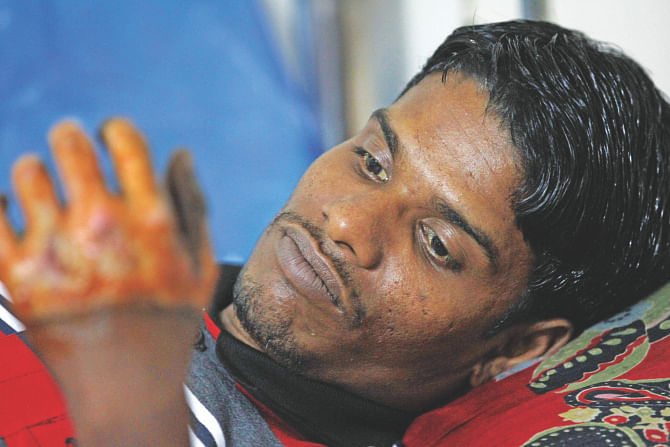In pain, in panic

“I will die. Doctors said I will not survive,” Anwar Hossain kept repeating, lying in his bed at the burn unit of Dhaka Medical College Hospital.
Asked which doctors told him this, he paused for a moment and pointed at some persons a few feet away from his bed. They were, however, visitors of another patient.
“They wanted to kill him,” said his wife Rabeya Begum. “He still cannot forget that night. Whenever he hears somebody speak loudly, he gets frightened. He is often incoherent.”
The 25-year-old auto-rickshaw driver was admitted to the hospital after suffering more than 20 percent burns in an arson attack last month.
He was returning home when some 10 suspected pickets intercepted him and hurled petrol bombs at his vehicle at Harinabazar in Chandpur around 2:00am on January 23.
He managed to escape and jumped into a nearby pond, but both his legs and left hand had already got badly burned.
At least 137 arson victims have taken treatment at the DMCH burn unit since the blockade began on January 6.
Of them, more than 68 patients, including Anwar, have got psycho-social services from Médecins Sans Frontières (MSF), known internationally as Doctors without Borders.
“About 58 percent of the burn patients at Dhaka Medical College Hospital were found to have post-traumatic stress disorder,” said Parthesarathy Rajendran, country director of MSF, a medical humanitarian organisation.
“The trauma of suffering serious burns, coupled with the permanent disfiguring of the face and body, can lead to severe and long-term psychological problems that impact a person's ability to live and work,” said Rajendran.
The violent scenes recurrently flash through their minds. They get frightened hearing loud sound; sometimes, they have suicidal thoughts.
Psycho-social care and support, primarily bedside counseling, help them overcome the trauma, experts say.
Zahidul Islam, a psychologist working with the Acid Survivors Foundation, said the whole life plan of the burn patients gets shattered.
“We use mental therapy for their relaxation, distract them from the traumatic memories and build confidence in them and their relatives,” said Zahid, who also provides psycho-social care to the burn victims.
Dr Samanta Lal Sen, adviser to the DMCH burn unit, said the victims, mostly from the poorer section of the society, remain worried about how they will earn their livelihood.
If the victim is a woman, she fears whether her husband would now accept her.
Victims' psycho-social care and rehabilitation are very important. Apart from the NGOs, the Department of Social Services needs to come forward, Dr Sen said.

 For all latest news, follow The Daily Star's Google News channel.
For all latest news, follow The Daily Star's Google News channel. 



Comments